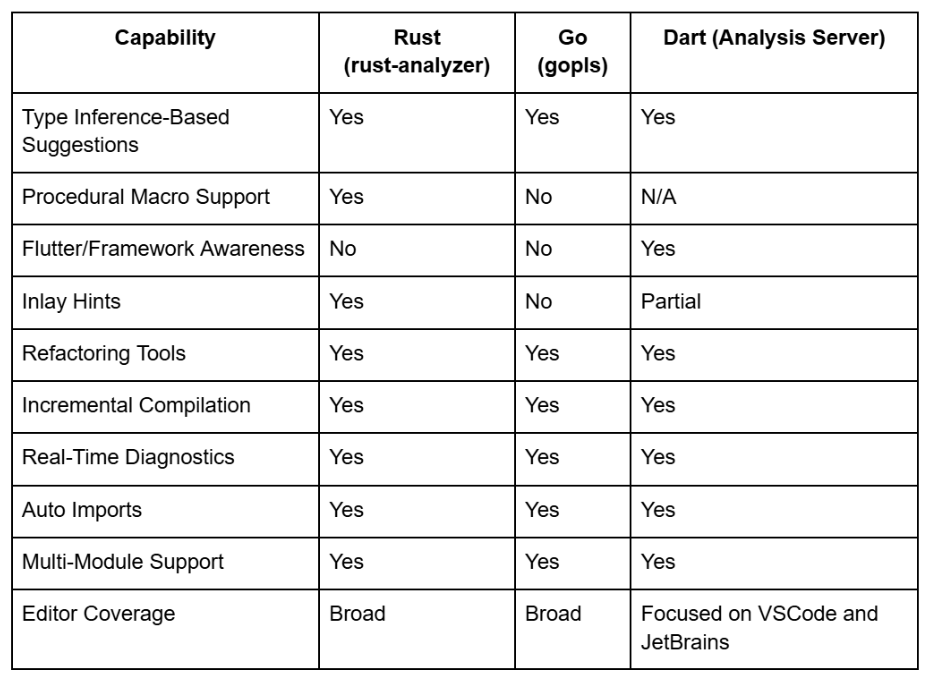
Code completion is a foundational capability in modern IDEs, streamlining developer workflows and reducing cognitive load during programming. For JavaScript and TypeScript, this space is mature, with feature-rich extensions backed by robust ecosystems. However, for non-JavaScript languages such as Rust, Go, and Dart, the tooling landscape is historically fragmented, requiring more explicit configuration and language-specific support. These languages often have unique syntactic and semantic rules, and generic language tooling falls short when used in production-scale projects. Completion plugins that understand the idioms, typing rules, and module systems of these languages are vital for maximizing efficiency and reducing error-prone development cycles.
This blog offers a technically detailed exploration of the available completion plugins for Rust, Go, and Dart, focusing on the developer experience, architecture of each plugin, performance benchmarks, language feature coverage, and cross-editor compatibility.
The primary tool for intelligent Rust development is rust-analyzer, a language server that has become the community's standard for advanced IDE support. Unlike its predecessor, RLS, which relied on rustc, rust-analyzer is built from the ground up to provide fast, incremental feedback by directly parsing Rust code and performing semantic analysis in a lightweight manner.
At the core, rust-analyzer uses a high-performance incremental compiler architecture that leverages rowan for syntax tree construction and chalk for trait solving. This allows the tool to offer near-instant completions, even on large, multi-crate projects. The plugin maintains an in-memory representation of the abstract syntax tree and tracks dependencies across the workspace, enabling accurate contextual suggestions, including trait methods, macros, and type-based field access.
For optimal usage, developers should configure rust-analyzer to enable checkOnSave with Clippy to surface potential issues during development, especially when dealing with unsafe code or complex lifetimes. Additionally, enabling procMacro.enable allows better support for codebases leveraging procedural macros such as serde and tokio_macros.
The Go language team officially maintains gopls, a robust and scalable language server offering powerful completion features. It is designed to serve as the backend for all modern Go IDE integrations, and it is tightly coupled with the Go compiler toolchain. Unlike ad hoc completion plugins, gopls uses the Go build system and standard Go packages to offer accurate and context-aware suggestions.
gopls builds an internal representation of the Go workspace by parsing module dependencies and utilizing type information from the go/types package. It uses a caching strategy to minimize redundant analysis and supports incremental parsing to ensure responsiveness in large codebases. It integrates seamlessly with Go modules and recognizes nested module configurations.
Enable staticcheck and analyses in your LSP settings to catch performance issues and potential bugs during development. In team environments, enable codelenses for test coverage insights and consistent formatting with gofmt. Developers working on monorepos with multiple Go modules should ensure gopls is configured with correct workspace root detection.
The Dart Analysis Server is bundled with the Dart SDK and offers full-featured support for both Dart and Flutter development. It provides real-time feedback on code correctness, suggestions, refactoring tools, and widget-aware completions for Flutter developers. It is built with tight integration into the Dart type system and supports asynchronous and reactive patterns.
The server operates by creating a complete model of the Dart program, building symbol tables, and performing static type analysis. It supports incremental updates to the abstract syntax tree and emits completion suggestions based on scope, context, and type signatures. It also leverages Flutter introspection metadata to provide widget-specific enhancements.
Developers building Flutter apps should enable dart.completeFunctionCalls for faster UI layout creation. When dealing with stateful widgets or complex widget trees, enabling widget rebuild visualization can highlight performance bottlenecks. For backend Dart development using shelf or aqueduct, the same analysis server offers reliable completion and linting support.

The tooling ecosystems for Rust, Go, and Dart are becoming increasingly sophisticated, driven by growing demand for reliable and scalable backend, systems, and cross-platform mobile development. Completion engines are moving toward deeper semantic understanding, tighter CI/CD integration, and the adoption of AI-assisted refactoring tools.
Completion plugins will increasingly adopt ML-based approaches to suggest code blocks, identify patterns across teams, and offer contextual documentation sourced from online repositories, RFCs, and community packages.
Rust, Go, and Dart now offer mature, production-grade completion plugins that rival the experience JavaScript developers have long enjoyed. Whether you are building low-level systems in Rust, scalable APIs in Go, or UI-rich mobile applications in Dart, the right completion tooling can drastically improve your productivity and confidence in code quality.
A properly configured development environment, paired with LSP-driven completion plugins, enables developers to write clean, idiomatic, and maintainable code with minimal friction.
For developers looking to extend their capabilities beyond completions into full-stack automation, testing, and deployment, GoCodeo offers an AI-native coding agent that integrates directly with VSCode. It supports multiple languages including Rust, Go, and Dart, and helps streamline the entire development pipeline from idea to deployment.
Visit GoCodeo to explore more advanced tooling for full-stack app generation and deployment.